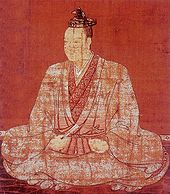- Akechi Mitsuhide
-
In this Japanese name, the family name is "Akechi".
Akechi Mitsuhide (明智 光秀, 1528? – July 2, 1582 Japanese calendar 6th month 13th day), nicknamed Jūbei or called Koretō Hyūga no Kami (惟任日向守) from his clan name and title, was a samurai who lived during the Sengoku period of Feudal Japan.
Mitsuhide was a general under daimyo Oda Nobunaga, although he became infamous for his sudden betrayal in 1582, which led to Nobunaga's death at Honno-ji. [1]
Contents
Early life and rise
His birthplace is not specified but is inferred to be in Kyoto or in Kani of Mino Province—now Gifu Prefecture. Toki-Akechi is a descendant of the shugo Toki clan. Mitsuhide began serving Nobunaga after the latter's conquest of Mino province in 1566 and received Sakamoto (in Omi, 100,000 koku) in 1571. Before serving Nobunaga, Mitsuhide had served Ashikaga Yoshiaki after Asakura Yoshikage. Although Nobunaga rarely put too much trust in his retainers, he particularly trusted Shibata Katsuie, Hashiba Hideyoshi, and Akechi Mitsuhide. Akechi Mitushide was the first subordinate who received a castle from Nobunaga. After Mitsuhide received Sakamoto he moved to pacify the Tamba region by defeating several clans such as Hatanao and the Isshiki of Tango. Mitsuhide also received Kamiyama castle and the Tanba region.
Betrayal of Oda Nobunaga
In 1579 he captured Yakami Castle from Hatano Hideharu by promising Hideharu peace terms. This accomplished Mitsuhide's goal, although Nobunaga betrayed the peace agreement and had Hideharu executed. According to several stories, this displeased the Hatano family, and a short while later several of Hideharu's retainers murdered Akechi Mitsuhide's mother (or aunt). The situation was fueled through several public insults Nobunaga had directed at Mitsuhide that even drew the attention of some Western observers. However, the reason Mitsuhide killed Nobunaga at the Incident at Honnōji on June 21, 1582 (Japanese: 6th month 2nd day) is not known.
He has been credited with killing Oda Nobunaga; while Mitsuhide did not execute Nobunaga personally, he did force him to commit seppuku.[citation needed] When they found out about the assassination, both Hideyoshi and Tokugawa Ieyasu rushed to be the first to avenge Nobunaga and take his place. Hideyoshi got to Mitsuhide first, and Mitsuhide's allies such as Hosokawa Fujitaka, who was related to Mitsuhide through a marriage, betrayed him. After Nobunaga was defeated, Mitsuhide hurried to Kyoto, where he was officially titled Shogun by the Emperor, who considered his claims legitimate as Akechi clan was seen as descendent of Minamoto clan. Mitsuhide survived for 13 days until he was defeated by Hideyoshi at the Battle of Yamazaki. Mitsuhide is rumored to have been killed by a peasant warrior by the name of Nakamura with a bamboo spear; however, there were also rumors that he was not killed, but rather started a new life as a priest called Tenkai. The short reign of Mitsuhide is depicted in proverb Akechi no tenka-mikka (Reign of Akechi lasts 3 days) and nickname Jusan kubo or shogun for 13 days.
Family lines
The Akechi family was able to trace their heritage to the Toki clan and from there to the Minamoto clan. It is noted that Minamoto Yoritomo brought the destruction of the Taira clan the same way Mitsuhide brought an end to Nobunaga, who traces his ancestry to the Taira clan.
The sword of Mitsuhide is of the Tensho style; in fact, the Tensho Koshirae was first designed to be a replica of Akechi Mitsuhide's own sword.
Family
- Tsumaki Hiroko (Ja:妻木煕子): Wife
- Akechi Mitsuyoshi (明智光慶): Eldest son
- Akechi Hidemitsu (明智秀満): Adopted son (and son-in-law); ancestor of Sakamoto Ryoma
- Hosokawa Gracia (明智玉子): Daughter, wife of Hosokawa Tadaoki; ancestor of Empress Shōken
- Akechi Mitsuharu (明智光春): : Cousin
In popular culture
See People of the Sengoku period in popular culture.
References
- ^ Shincho Koki 信長公記
Categories:- 1520s births
- 1582 deaths
- Akechi clan
- Daimyo
- Japanese warriors killed in battle
- Oda retainers
- People of Azuchi-Momoyama period Japan
- People of Muromachi period Japan
- Samurai
Wikimedia Foundation. 2010.


